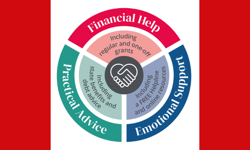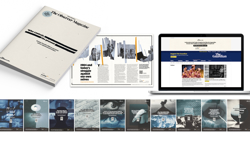| State of online development | |
| Over the course of four issues, Andrea Kirkby will review the state of online development as follows: | |
| Sep/Oct 2005 | National newspapers |
| Nov/Dec 2005 | Consumer magazines |
| Jan/Feb 2006 | Regional newspapers |
| Mar/Apr 2006 | B2B Magazines |
Local media groups have been broadening their remit over the past ten years. That has included a number of different approaches - launching lifestyle magazines and property papers, as well as business supplements to address younger or female demographics and business users. For instance, Archant in Norwich had seven different media formats in 1994 - now it has 17.
In Kent, the Messenger group closed its daily paper in 2003 but now operates a number of magazines and a website, as well as weekly papers and radio. Robert Ray, marketing director of the Newspaper Society, mentions it as ‘quite a holistic vehicle – reaching audiences in a number of ways to deliver superior, local content to its users.’ That’s the ideal for all local media, though not all groups are pursuing it quite so far.
The broadening of media includes the web - but the web is only part of it. As Tim Bowdler, CEO of Johnston Press, says, ‘media fragmentation is the overall trend.’ So regional newspaper publishers are moving on to the web, but they are driven by media fragmentation, rather than by a particular desire to be players in the electronic media.
Bowdler sees the internet as expanding the reach of existing media, rather than changing the nature of the medium itself. ‘It’s enabling us to reach far more deeply into communities. We are the market leading community publisher in most of our markets, we have to deal with our communities in the way in which they want us to communicate.’ To some extent, then, local papers are followers of media trends, waiting for their users to express a demand, and not early adopters of new technology.
If you address the question of local newspapers’ use of the web purely in numbers, they seem to be doing well, with over 600 local paper websites in total. For instance, Newsquest’s ABC Electronic audit showed 2.3m unique users in October 2005 with 316 titles represented by 90 different websites. Trinity Mirror has 45 local websites in its ‘ic’ network, and Northcliffe 29 within the ‘thisis’ network; Archant has 120 websites (not all newspapers) while GMG gets 5m users a month on its 26 regional sites - notably Manchester Online. Most of the other larger groups have similar representation online. And significant resources are being deployed, with 30 developers working on 200 websites at Johnston Press in addition to content sourced from the papers themselves.
Local papers still have remarkably strong brands and this is easy to exploit online. According to Robert Ray, ‘if you take the core value of a local newspaper, it’s about local news and local information.’ He mentions a survey that showed 42% of people looking for a job would go to the local newspaper first. ‘The key thing is how you expand the parent brand, and we think the brand value is certainly spinning off to the web. Look at the sphere of influence of the traditional offline product, it’s a really interesting prospect, but you have to project and manage that portfolio properly.’ In his view, the brand can be expanded across several media - as Kent Messenger is doing, for instance - and a key issue for the industry is ‘how we go about measuring the total footprint of the paper to aggregate the net reach of a brand across its portfolio.’
Shallow sites
The effectiveness with which this is being done is questionable. Sites generally are not as deep as those of the nationals, and where they have clearly demarcated sections those are most often based on classified sections (property, jobs) rather than on subject matter or geography. While, in many cases, each title has a site which retains the ‘look and feel’ of the paper - for instance, Archant has two sites for Norwich, the ‘quality’ EDP site and the more populist, colourful Evening News site - some other groups have taken the decision to rebrand their content online as ‘thisis’ or ‘ic’, possibly losing some of the value of the title brand. Some of the Trinity Mirror sites are particularly disappointing - icNorthLondonOnline’s branding is vestigial and the top story, ‘Blair to meet Chirac before summit’, doesn’t seem particularly relevant to Ponders End.
Besides, there must surely be an opportunity for sub-sites focused on local content other than news - for instance, local business (Archant, to its credit, has done this) or lifestyle. Local papers have spawned special supplements and magazines in print, but on the web they remain largely focused on the top five stories of the day. One can't help feeling there’s a missed opportunity here, particularly since the cost of spawning a new website or sub-site is so much less than the cost of printing a new magazine or supplement.
Cannibalisation worries recede
Still, the regional press has got over a feeling that the internet would cannibalise its circulation. Most groups now believe the internet can help find new readers - and doesn’t stop people buying the paper. Roger Green, who is responsible for digital media at Newsquest, says ‘cannibalisation just isn't an issue’ any longer - the user’s lifestyle, rather than the availability of online content, tends to determine users’ access to the content. (Those who commute buy the paper - those working at home browse online.) Tim Bowdler believes the web often finds younger users who might not buy a local paper. ‘There is a significant overlap between the website and the paper – the majority of people online also read the paper, but there’s also a proportion who don’t.’ As Robert Ray says, ‘the sector is generally embracing the whole online area.’
Late adopters
In terms of technology, none of the regional paper sites are leading edge. Few are doing RSS, and none that I could find are podcasting. Roger Green says that Newsquest might look at the latter, though he still believes that ‘podcasting gets talked about more than it gets done.’ As for user generated content and citizen journalism, a few bulletin boards and forums exist, but few blogs have yet been created on regional paper sites. Tim Bowdler says, ‘we will undoubtedly be going down this route’, but, at the moment, Johnston Press has done so to a very limited extent.
Moreover, while the national newspaper sector has strong online opinion leaders such as Simon Waldman and Richard Withey, the regionals appear pragmatic and low key. None have staked out advanced new media ground in the way the Guardian has done with RSS and blogs, and few are using audio or video on their sites to any great extent (though the EDP recently had a video story about a hawk that had flown into Norwich market and eaten a pigeon, rather messily). Perhaps the strong culture of many local papers precludes truly revolutionary thinking. Manchester Online seems one of the major successes - perhaps driven at least partly by being in the same group as the highly web aware Guardian.
It’s interesting that there are no regional newspaper groups in the Association of Online Publishers, which seems to suggest they see the web as an adjunct to their print business rather than as a separate media model. Contrast the national papers, where the Guardian, Telegraph Group, News International, and Independent Digital are all active members.
Slow to audit
Besides, few of the regionals appear to consider their online activities important enough for a full audit. Only Northcliffe and Newsquest have had ABC Electronic audits in the last eighteen months - and the Yorkshire Post, the only other regional in the list, hasn’t had an audit since 1997. Though Roger Green believes ‘having audits for one’s circulation and one’s website seems to be a minimum standard of professionalism’, he still thinks an annual audit is enough.
The audits are not carried out at a high level of detail, either. Richard Foan of ABC Electronic, points out that, technologically, it is not a problem to break out the results of separate sites within the group – ‘we can audit the whole shebang and break it out as and when they want. Technically it’s no problem at all; commercially, they choose what they want to give to the industry.’ In print, for instance, Northcliffe declares local sub-editions’ ABCs down to the level at which they sell display ads – it’s not as sophisticated as that online yet.
Online threats – BBC & co
What is quite worrying, though, is that the online competition is hotting up - and while the nationals have had to adapt to a market in which the BBC, Yahoo, MSN and Google are all pushing into their patch, the regionals haven't yet made that transition. Richard Foan believes they need to look ahead. ‘Craigslist is a real threat – non-print brands in general are a real threat. And there’s also Google,’ he says.
The BBC is already a competitive threat online, with strong content, though of course no advertising, and the Newspaper Society has been lobbying hard on the issue of the ‘Where I live’ websites trespassing on its members’ territory. If the BBC offers the same listings as the local paper, it’s using public funds to compete with commercial newspapers.
The Newspaper Society argues that ‘the experience of BBC Online suggests a track record of interpreting a widely-drawn remit as a mandate for dominance of a nascent medium. At a stage when local online or TV services are starting to become commercially viable, a large scale BBC rollout could undermine the business case for commercial innovation and distort investment decisions.’ That raises the spectre of a long term future in which the BBC becomes the monopoly provider of local digital content.
And, meanwhile, other players are competing for advertising, so the local press faces a two-way squeeze with the BBC issuing more and more local content and advertising revenues being pulled away to more ad-focused sites. Over the past five years, much recruitment advertising, and an increasing slice of property advertising, has gone on the web (though regional paper websites account for 30 percent of the total). And now, Craigslist is targeting a slice of that income too.
Online threats - Craigslist
Craigslist hasn’t made a great impact yet in the UK. Tim Bowdler claims that ‘we’re not seeing any significant evidence of migration’ as yet, and Roger Green also believes its success has been limited to major urban areas - ‘it’s not going to replace the local paper in smaller towns or in the country.’ Indeed its design is very basic, it has no bells or whistles, and its classifieds are free. It has what Susan MacTavish Best, Craigslist’s PR, defines as a ‘public service mission’, so it hasn’t really marked out local papers as competitors, and doesn’t offer local news. It may cover 190 local communities in 35 countries, but only ten of these are in the UK, and they get 8m page views a month, against 17m for Thisislondon.co.uk alone. And, when I looked, there were only 17 job ads for the whole of Bristol.
But in the US, Craigslist is a potent force for change. In some markets, Craigslist has forced local papers into offering free classifieds, vastly diminishing their profitability. The same could easily happen here.
While Craigslist could be a heavy hitter on classified, it currently has little content. But Craig Newmark, its founder, is getting involved with citizen journalism – though, currently, outside the Craigslist structure - and Susan MacTavish Best says ‘we are watching the mounting enthusiasm for the movement with interest.’ Like many new media companies, it can act very fast indeed - will it be too nimble for the regional press?
Undermining local brands?
Looking at the acquisitions that DMGT and Trinity Mirror have made recently, you can't help feeling that the industry is purely driven by classified advertising - content hasn’t had a look-in. Trinity Mirror has bought online recruitment advertising sites Hotgroup, GAAPweb.com and Secsinthecity.com, as well as smartnewhomes.com.
Meanwhile DMGT has paid £48m for Primelocation.com, another property portal, on top of two online recruitment purchases earlier this year - at the same time as it announced that it was selling its regional newspapers. The industry is driven by classifieds - not by circulation - and online development seems, for some players, to be replacing the regional papers, not enhancing their value. Whatever their protestations in public, their actions show that they don’t attribute real value to their local title brands.
That’s probably been the case for some while. For instance, the Fish4jobs brand, founded by a number of regional groups, can be seen in two ways. Roger Green believes that it ‘gives us the best of both world when we are selling to employers – we can offer a full range of recruitment services,’ including print and online advertising together with job fairs and an online CV matching service. Richard Foan agrees - ‘I think the fish4 brand is interesting and is a perfect opportunity to retain many of their advertisers.’ But it dilutes the local brands - asserting its own brand value, rather than that of the local newspaper - and takes the classifieds out of the local news context. Seen in that perspective it is a poor strategic move.
Monetised content – little progress
Meanwhile, content in the local market hasn’t been monetised. In sharp distinction to the nationals and the B2B market, there’s no paid-for content. As Roger Green notes, ‘we don’t currently charge for content and I don’t think it will be possible for us to do so unless it’s very specialist.’ Much local information, for instance planning applications, is now available free from councils over the net, and other information has been grabbed by B2B players such as Estates Gazette (whose ‘how much who paid for what’ services he quotes as a major success in monetising local content). Archant tried to make its business content paid-for on the website, but in the last year it has withdrawn from that position and made it available for free. Nor have local papers gone far down the route of paid-for wireless content. So their websites remain a cost, in many cases, rather than a separate profit centre.
Local content, surely, has a value, but so far, no one has managed to work out what that value is or how to turn it into revenue. Without advertising to support it, local content needs a separately funded future online - but it’s difficult to see where that funding is going to come from.










